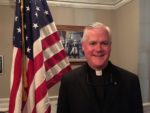Where Does Belief in God Lead Us?
Robert Cardinal Sarah offers this challenging answer to what faith demands in his book God or Nothing: A Conversation on Faith with Nicolas Diat: “The man who believes agrees, like Abraham, to become the prisoner of the invisible God; he agrees to let the Father possess him in obedient listening, docility of heart, and the lights of his intellect. His walk toward God is consent and abandonment, without expecting to benefit from reassuring guarantees.”
Believing in God means agreeing that God shows us how we should proceed in life, though he does so in mysterious, invisible ways. There are no “reassuring guarantees” that this or that plan or expectation of ours will turn out as we would like. And that can be trying. We’d rather turn to God and insist: “I did my part in saying yes to you, now please do your part in saying yes to what I want from you.” It don’t work like that!
These days, the descent of both the Catholic Church and our own country into folly and irrationality is apparent even to casual observers. Two Cardinals—Marx of Munich and Hollerich of Luxembourg—have publicly rejected the Church’s teaching on the inherent immorality of homosexual activity without evincing the slightest recognition that this action violates their solemn obligation to teach God’s truth. That they previously took an oath to uphold the teaching they now blithely condemn as un-Christian evidently gives them no pause.
We also see American officials, including President Biden, attempting to coerce citizens into believing that a man (or woman) can simply declare himself (or herself) to be a woman (or man). This magical claim of transformation is treated as a scientific fact; the rest of us are expected to welcome it or face the prospect of ostracism and revilement.
It is into the midst of this chaos that God has placed us. Our duty as believers is to let him lead us where he will, trusting in his grace and strength. He has put us here now for a reason and a purpose. While we would rather not have to confront unbelieving churchmen and totalitarian politicians who would foist their rebellion against reality on us, we are called to remain faithful to God’s truth. This means learning how to respond to the world around us in ways that are pleasing to God, and, by our confident witness to truth, goodness, and beauty, draw others to him.
Even our enemies cannot but be amazed when we calmly and resolutely assert our allegiance to God’s truth in the face of threats and persecution. The fidelity to God that leads us to reject the false claims of worldly men is precisely the fidelity we learn from contemplating the passion and death of Jesus Christ. Holy Week will soon be upon us. It is the perfect time to ask God once again to give us docility of heart and the grace of obedience—to do what we know he expects from us and willingly suffer the consequences, without demanding in return that he grant us any guarantees.
Faith is a willing (and liberating!) entrustment of our whole life to God’s plan for us, not knowing ahead of time how that plan will unfold. What we do know is that God will be with us every step of the way as we journey towards salvation, where the invisible God will be seen face to face by those who have remained faithful to him. That is the only guarantee we are given—one we can look forward to when things in this world are looking bleak.










